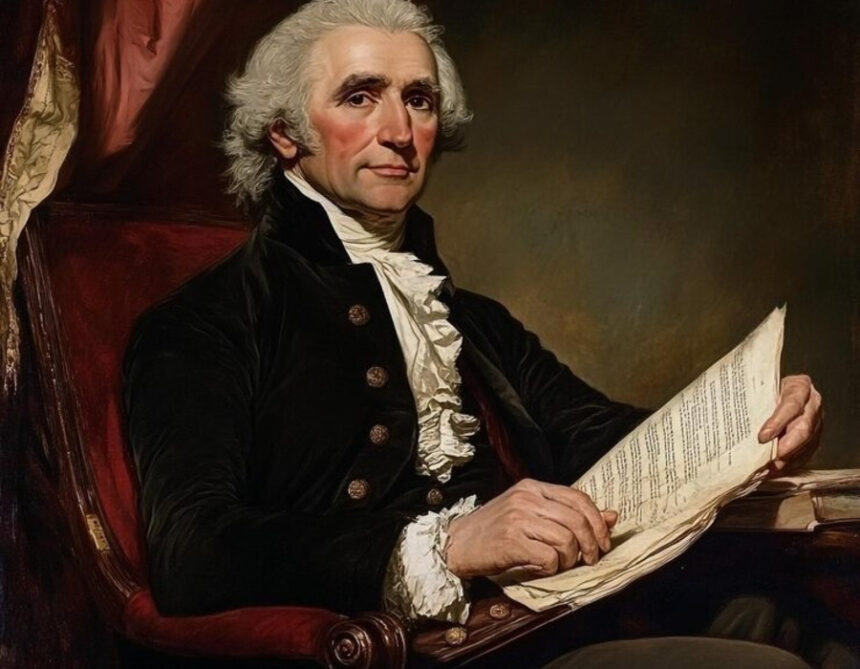Jean-Jacques Rousseau, a prominent Enlightenment thinker, significantly shaped modern political thought, particularly the principles underlying democratic governance. His ideas on popular sovereignty, individual liberty, and the social contract deeply influenced the American Founding Fathers as they crafted the Constitution and established a new government.
- Rousseau’s Political Philosophy and Its Core Principles
- The Influence of Rousseau’s Social Contract on American Government
- Ways Rousseau Shaped American Democratic Principles
- Rousseau’s Influence on the American Revolution
- Modern-Day Reflections on Rousseau’s Influence on U.S. Governance
- Final Remarks
- FAQ’s
The impact of Rousseau’s theories can be seen in various aspects of American democracy, including the emphasis on the will of the people, representative government, and the protection of civil liberties. This article explores how Rousseau’s political philosophy influenced the founding of the United States and the evolution of its democratic principles.
How Did Rousseau Influence American Government?
Rousseau influenced the American government by promoting the idea of the social contract, which asserts that legitimate political authority stems from the consent of the governed. His concept of popular sovereignty inspired democratic principles seen in the U.S. Constitution, emphasizing that government must reflect the will of the people. Rousseau’s advocacy for individual freedoms and civic participation contributed to the establishment of a government designed to protect rights and promote democracy.
Rousseau’s Political Philosophy and Its Core Principles
Jean-Jacques Rousseau’s political philosophy was centered on the idea of the social contract, where individuals voluntarily unite to form a government that protects their collective interests. He argued that legitimate political authority must derive from the people, a principle that would later influence the foundation of American democracy.
Rousseau’s theory of popular sovereignty posited that government should reflect the collective will of the people rather than being dictated by monarchs or elites. This principle was foundational to the American Revolution and the framing of the U.S. Constitution, emphasizing governance based on the consent of the governed.
Another key aspect of Rousseau’s ideology was his belief in direct democracy, where citizens actively participate in decision-making. While the U.S. adopted a representative democracy, elements of Rousseau’s philosophy persist in the form of referendums and initiatives, allowing citizens to influence government policies directly.
His views on equality and civil liberties also played a role in shaping American political thought. Rousseau championed the idea that all individuals are born free and should have equal rights, a concept echoed in the Declaration of Independence.
The Influence of Rousseau’s Social Contract on American Government
Understanding the Social Contract
Rousseau’s Social Contract Theory states that individuals willingly surrender some freedoms in exchange for the protection and stability provided by a government. This idea laid the groundwork for the American Constitution.
Application in the U.S. Constitution
The Constitution reflects Rousseau’s social contract principles by ensuring that the government derives its legitimacy from the people through elections and representation.
Checks and Balances
Rousseau’s philosophy encouraged limiting governmental power through a structured system of checks and balances, a fundamental element of the U.S. government.
The Role of the People in Governance
Rousseau’s advocacy for civic participation is evident in the American system, where citizens have the right to vote, petition, and engage in government affairs.
Influence on the Bill of Rights
Rousseau’s emphasis on individual rights is reflected in the Bill of Rights, which safeguards freedom of speech, religion, and assembly.
Ways Rousseau Shaped American Democratic Principles
- Popular Sovereignty: Rousseau’s philosophy emphasized that legitimate government authority must originate from the will of the people. This principle became a foundational concept in American democracy, ensuring that governance is based on the consent of its citizens. The U.S. Constitution reflects this idea through representative democracy, where elected officials act on behalf of the public, embodying Rousseau’s vision of a government accountable to the people.
- Republicanism: A major influence of Rousseau on the American government was his advocacy for a system in which leaders were chosen by the people rather than by hereditary rule. This concept is embedded in the U.S. system of republicanism, where citizens elect representatives to govern on their behalf. His rejection of absolute monarchy supported the development of a government that prioritizes elections and democratic representation.
- Protection of Civil Liberties: Rousseau’s belief in individual freedoms inspired the inclusion of protections for civil liberties in the U.S. Bill of Rights. His ideas on personal freedom, free speech, and the right to challenge government authority influenced the protections enshrined in the first ten amendments of the Constitution, ensuring fundamental rights for all citizens.
- Equality Before the Law: One of Rousseau’s strongest beliefs was that all individuals should be treated equally under the law. This principle played a role in shaping the American legal system, where laws are applied uniformly, regardless of social class or background. The principle of equal protection under the law continues to be a cornerstone of the U.S. judicial system.
- Direct Democracy Elements: While the U.S. operates primarily as a representative democracy, elements of direct democracy—such as referendums, ballot initiatives, and public petitions—reflect Rousseau’s vision of active citizen participation. These mechanisms ensure that the voice of the people can directly shape policies and laws, reinforcing the democratic ideals he championed.
Rousseau’s Influence on the American Revolution
Jean-Jacques Rousseau’s philosophies played a significant role in shaping the revolutionary ideals that led to the founding of the United States. His writings on liberty, self-governance, and the social contract provided intellectual justification for the American colonies’ break from British rule. Rousseau argued that government should be based on the consent of the governed, an idea that resonated deeply with colonial leaders who sought independence from an oppressive monarchy. His belief that political authority must derive from the collective will of the people became a fundamental principle in the formation of the new American government.
The impact of Rousseau’s philosophy is particularly evident in the Declaration of Independence, written by Thomas Jefferson. The document reflects Rousseau’s core belief that governments exist to serve the people and should be dismantled if they fail to uphold their rights. Jefferson’s assertion that all men are created equal and possess unalienable rights to life, liberty, and the pursuit of happiness aligns with Rousseau’s vision of a just and equitable society. By emphasizing that rulers derive their legitimacy from the people rather than divine right, the Declaration of Independence echoed Rousseau’s rejection of absolute monarchy.
Additionally, Rousseau’s concept of the general will greatly influenced the principles upon which the U.S. government was built. He believed that laws should be designed to benefit society as a whole, rather than favoring a privileged elite. This idea inspired the creation of a democratic system where elected representatives would serve the interests of the people. Revolutionary leaders embraced these ideals to justify their fight for independence and to establish a government that prioritized popular sovereignty, civic participation, and the protection of individual freedoms.
Modern-Day Reflections on Rousseau’s Influence on U.S. Governance
- Democratic Institutions: Many of Rousseau’s principles remain central to the structure of democratic institutions in the United States. His emphasis on popular sovereignty is reflected in the system of elected representation, ensuring that government derives its legitimacy from the people. Constitutional protections, such as checks and balances and the separation of powers, align with Rousseau’s vision of governance that prioritizes the common good over individual rule. His philosophy continues to shape democratic governance by reinforcing the idea that laws and policies should reflect the collective will of the people.
- Judicial Protections of Rights: Rousseau’s influence extends to the American judicial system, where courts play a crucial role in safeguarding civil liberties and ensuring democratic values are upheld. The judiciary functions as a guardian of constitutional rights, ensuring that laws remain fair, just, and aligned with democratic principles. Judicial reviews conducted by the Supreme Court and lower courts help maintain the balance between government authority and individual freedoms, embodying Rousseau’s advocacy for a just legal framework that protects all citizens equally.
- Civic Participation: Rousseau strongly believed in the active participation of citizens in governance. His ideals are evident in modern democratic movements, including voting rights activism, grassroots political engagement, and public policy referendums. Citizens today engage in civic processes through elections, petitions, and advocacy, reflecting Rousseau’s idea that a government should be directly influenced by the people it serves.
- The Role of Government in Social Welfare: Rousseau’s philosophy emphasized the responsibility of government to prioritize the common good. This principle influences contemporary policies related to social welfare, healthcare, education, and economic equity. Programs that provide essential services to citizens, such as public healthcare and social security, align with Rousseau’s belief that governments should protect and enhance the well-being of their people rather than serve the interests of a privileged few.
Final Remarks
Jean-Jacques Rousseau’s political philosophy remains deeply embedded in the foundation of American government. His ideas on popular sovereignty, social contract, and individual liberties continue to influence democratic principles today. While the U.S. adapted Rousseau’s theories to fit a representative democracy rather than a direct one, his core belief that government must serve the people endures as a guiding principle.
Rousseau’s influence extends beyond the founding documents—his philosophy continues to shape political debates, social policies, and democratic ideals. Understanding his impact helps contextualize the values that define American governance and democracy.
FAQ’s
Q. How did Rousseau’s social contract influence the U.S. Constitution?
A. Rousseau’s social contract theory emphasized government legitimacy through the consent of the governed, which became a foundational concept in the U.S. Constitution.
Q. What Rousseau’s ideas are reflected in the Bill of Rights?
A. Rousseau’s advocacy for civil liberties influenced the Bill of Rights, ensuring freedoms such as speech, religion, and assembly.
Q. Did Rousseau directly impact the American Revolution?
A. Yes, his writings inspired revolutionary leaders, reinforcing the idea that government should serve the people or be reformed.
Q. How does Rousseau’s idea of popular sovereignty apply today?
A. Popular sovereignty remains a core democratic principle, ensuring that government decisions reflect the will of the people through elections and civic engagement.
Q. What are modern examples of Rousseau’s influence in the U.S.?
A. His influence is seen in democratic movements, constitutional law, and policies promoting equality and the common good.




